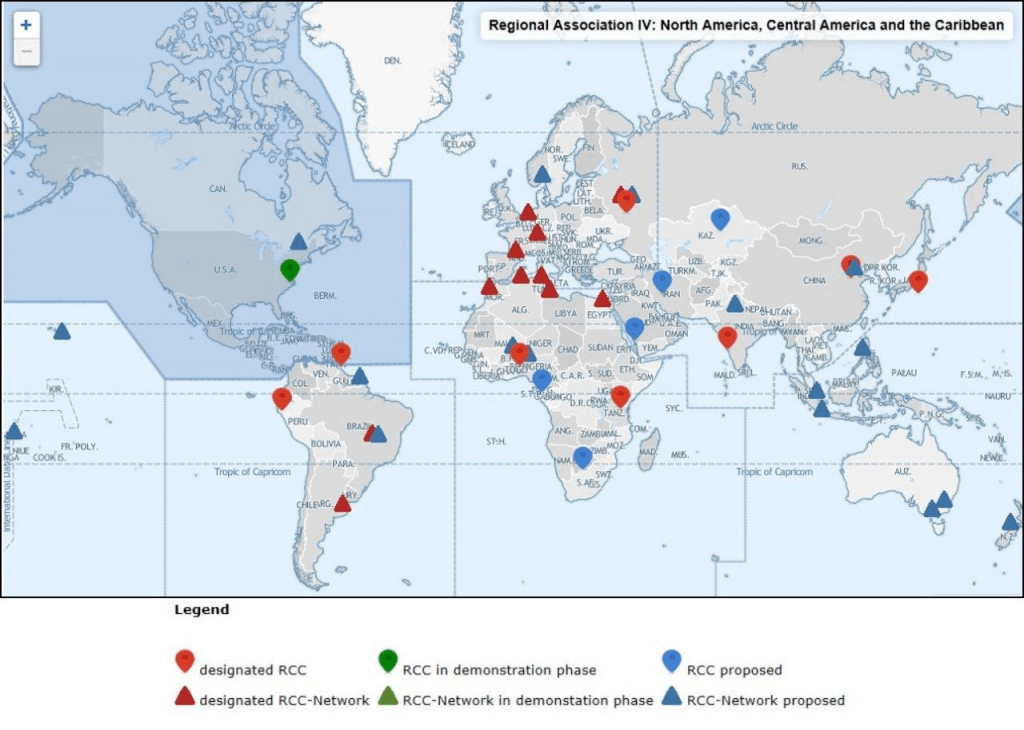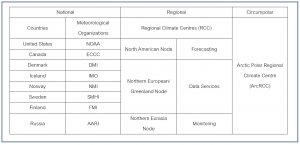
Working Together for the Arctic: The Arctic Regional Climate Centre Network (ArcRCC)
– by Michael Crowe, Katherine Wilson, and John Parker –
The effects of climate change are being felt around the world, but nowhere as intensely and as obviously as in the Arctic. Many sources can be cited that put the rate of temperature increase in the Arctic over the last 30-50 years as at least twice that over the rest of the globe. These temperature increases have led to significant reductions of sea ice, thawing permafrost and coastal erosion that affect all Northerners, including Indigenous communities and industry.
However, climate change does not mean a consistent trend towards warmer temperatures and a reduced ice cover in the Arctic. Climate change is causing great variability in weather and sea-ice conditions in the Arctic. Take, for example, the previous summer of 2018 in which ice conditions in the Canadian Arctic were within normal, but heavier than experienced recently. This caught many mariners off guard resulting in Arctic tourist cruises re-routed and communities in the Western Arctic not receiving their annual sealift. High variability in weather and ice conditions can also mean greater risks to Northerners due to the increased frequency of storms and drifting ice. This reality is causing governments of Arctic nations to focus on new services to assist decision-makers to adapt to these rapid and variable changes in climate. The impacts right now are real and pose serious threats to infrastructure, ecosystems and Communities, including affecting a Northern way of life that remains rooted in traditional ways of living off the bounty of this unique ecosystem.
The World Meteorological Organization (WMO) through its Global Framework for Climate Services is assisting its Members to meet their adaptation planning and decision-making needs by establishing Regional Climate Centres (RCC). Building on this concept, Arctic Nations are partnering to establish the Arctic Regional Climate Centre Network (ArcRCC-Network), a unique version of an RCC to provide ongoing and regular climate information to meet the unique needs of Northerners.
A key activity of the Network is the conduct of a semi-annual Pan-Arctic Regional Climate Outlook Forums (PARCOF). The PARCOF follows the concept of the Regional Climate Outlook Forum (RCOF), whereby regular meetings are hosted by RCCs with stakeholders to provide climate outlooks and raise awareness.
The ArcRCC-Network is currently in year 1 of a 2-year demonstration phase, as part of the requirements to seek formal designation as a WMO RCC-Network. This article reviews the development and formation of the Network, its PARCOF, the first few meetings and lessons learned, and future plans.

Arctic Regional Climate Centre Network (ArcRCC)
Endorsed by the WMO, RCCs are normally National Meteorological/Hydrological Service Centres that have stepped forward to take responsibility for the provision of an identified suite of climate products and services for a particular region (See Figure 1). The RCCs assist WMO Members in the given region to deliver better climate services and products (such as regional long-range forecasts), and to strengthen their capacity to meet national climate information needs.
The Arctic Regional Climate Centre Network (ArcRCC-Network) is based on the WMO RCC concept, but with active contributions from National Meteorological and Ice Services in all the Arctic Council member countries (Canada, Denmark, Finland, Iceland, Norway, Russia, Sweden, USA) through a mutually agreed virtual structure that divides the responsibilities for the provision of services amongst the members.

The sub-regional geographical nodes of the ArcRCC-Network are (i) North America, (ii) Northern Europe and Greenland and (iii) Eurasia. Each node will also undertake a cross-node functional lead for the entire pan-Arctic domain: Canada leads the development of Long-Range Climate Forecasts; the Russian Federation leads Climate Monitoring; and Norway leads operational Climate Data Services. (see table Fig 2).
Members of the ArcRCC-Network are collaborating to:
- Provide climate information products;
- Fill gaps and potentially harmonize products and services between countries; and
- Enhance collaborative research and development
ArcRCC Products
Seasonal Summaries provide an overview of the previous winter/summer season for the circumpolar Arctic. The summaries describe actual temperature, precipitation and sea-ice details/trends based on observations and compared to historical trends.
Seasonal Outlooks provide forecasts for the upcoming winter/summer season:
- Temperature: above/below normal based on model outputs
- Precipitation: above/below normal based on model outputs
- Sea-ice: extend above/below based on model outputs
Arctic Consensus Statement is a collaborate effort by the network which reviews the trends in the historical monitoring data, recent observations, forecasts from models and utilizes regional expertise to fill gaps in the data to develop a consensus forecast for the Arctic region. Please see the ArcRCC website to view the current products at www.arctic-rcc.org.
PARCOF is a flagship activity of RCCs around the world is the Regional Climate Outlook Forum (RCOF). RCCs meet with climate information providers and users on a regular basis (quarterly or semi-annually) to review climate forecast products for the region, to better understand user needs, identify gaps, co-develop products and to generally raise awareness of the changing climate and how the information can be used to better prepare for the changes to come.
The Pan-Arctic Regional Climate Outlook Forum (PARCOF) is held twice per year: a face-to-face meeting in May prior to the Arctic summer season; and a virtual meeting in October prior to the Arctic winter season. The face-to-face forums are dedicated to meeting and working with Arctic climate users to:
- Share the current state of climate products available for the Arctic
- Better understand their needs
- Co-produce the output products (i.e. regions, graphics, plain language text)
- Develop a model for engaging with users in future outlook forums
Results
The first annual cycle of the PARCOF is now complete, with the first in-person summer meeting having taken place in Ottawa, Canada, May 15 to 16, 2018, and the first virtual winter meeting hosted by the Eurasian node Oct. 30, 2018.
The PARCOF-1 meeting invited Arctic Commercial Shipping users and Circumpolar Indigenous organizations to participate, and a key outcome was an integrated ArcRCC Consensus Statement for Summer 2018. The statement synthesized the current climatological conditions and outlooks for temperature, precipitation and sea-ice to highlight potential implications or risks for decision-making by various sectors. This consensus statement was announced through a WMO press release and launched the official start of the ArcRCC demonstration phase.
Of particular interest and value from the PARCOF-1 was the user feedback. The Indigenous and shipping organizations that participated provided comments that were open, honest, gracious, extremely valued, and will help to shape the products and how they are communicated during the PARCOFs ahead. The feedback covered the products themselves, the level at which they were presented, the timeframes that the outlooks covered and much more. Some of the lessons learned based on the feedback:
- Products need to be designed from a user’s, not a modelling output perspective. Currently the products are not intuitive. Training and a manual on the products could be useful but training material needs will vary greatly so, better that the products be designed so anyone can understand them without training.
- Arctic Indigenous peoples are not only users, but producers of environmental information. National Meteorological and Ice Services need to look at how to work with Indigenous Knowledge producers to co-develop culturally relevant local and regional scale products.
- National and International organizations separate climate and weather services, but users do not. They are interested in all temporal scales from hourly to 2-3 years in advance depending on their use. ArcRCC and their partners at National Meteorological and Ice services will need to find a way to bridge the climate and regional/local weather products.
- To invite and prepare users for the PARCOF takes time and effort. The users that were invited to the Ottawa PARCOF were contacted 6 months in advance and several telephone and/or face-to face conversations took place to explain: the ArcRCC; the objectives of the PARCOF; their role in presenting and in the break-out sessions; and to determine their interest and objectives in participating. This will need to continue to be a shared ArcRCC-Network effort.
- Although the modellers prefer to have the PARCOF in May, as the skill of the forecasts improves as you get closer to the summer season, the shipping and Indigenous representatives noted that May is a very busy time for summer operations and Indigenous peoples are out one the land/sea-ice hunting and fishing. Greater user participation would be possible in April.
PARCOF-2 was hosted virtually by the Norwegian Meteorological Institute of the Northern European/Greenland node, and published another Consensus Statement that included a seasonal summary and forecast verification of the 2018 summer season, and outlook for the first half of the 2018/2019 winter season.
Another key result has been the launch of the Arctic RCC Networks webpage. This site offers a one-stop shop for all information related to the ArcRCC-Network including past meeting reports and Consensus Statements, access to climate monitoring products, datasets, long-range forecasts and links to regional products and services based on the geographic nodes of the Network. Members have noted particular user satisfaction with this single-entry access to climate services related to the Arctic.
Path Forward
Future PARCOFs will be hosted by various ArcRCC network members in other circumpolar countries. The end-user focus of the forums will be discussed amongst the network and will be influenced by where the next forum is held. Arctic Council and Indigenous participants will be invited to all future forums as their needs cut across all sectors. Future PARCOFs may include other Arctic climate users such as (but not limited to):
- Arctic Ecosystems and Wildlife
- Arctic Defence, Marine Safety, Search and Rescue, Regulators, Pollution/Oil Spills
- Arctic Health and Populations
- Natural Resource Development
- Infrastructure: Terrestrial, Marine, Telecommunications
- Arctic Policy/Science
About the Authors

Mike Crowe retired in 2016 after 30 years with the Meteorological Service of Canada. The first part of his career was spent as a field technician in the Western Arctic followed by a few years as an operational weather forecaster in Alberta. He then moved to headquarters and worked in client services for aviation weather services. The last ten years of his career were spent in Corporate Policy and Planning positions where he was involved in MSC contributions to Northern Policy development, among many other things. He continues to stay involved in meteorology at the International and domestic levels with a focus on climate services.
Katherine Wilson is Chief of Strategic Policy and Planning at Canadian Ice Services, and John Parker is the Director of Marine and Ice Services at MSC.
More like this:
- Real-Time Ice-Ocean Observations for a Changing Arctic Environment
- Pearl at the Pole: An Update on Canada’s Polar Environment Atmospheric Research Laboratory
- Excerpts from the Journal of the Eureka Weather Station 1947-48
- Isachsen – An Artist’s Exploration of Isolation Through the Eyes of his Father at a Remote Arctic Weather Station
ArcRCC, Arctic Climate, Michael Crowe, PARCOF, Regional Climate Centre
